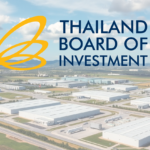The Factory Act (No. 2) B.E. 2562, an amendment to the 1992 Factory Act, outlines crucial factory license requirements in Thailand. This legislation aims to streamline business operations while ensuring safety and environmental standards. For foreign companies looking to set up a factory, understanding these requirements is critical for smooth operations.
Understanding the Factory License Requirements in Thailand
To operate legally, it’s essential to determine if your factory falls under the categories defined by the Factory Act B.E. 2562. The Act defines a factory as any building, location, or vehicle that meets one of the following criteria:
- Employs 50 or more staff
- Uses machinery exceeding 50 horsepower
This updated legislation marks a significant change from the older 1992 Act, providing more flexibility for businesses, especially foreign entities setting up in Thailand.
Categories of Factories and Their Licensing Requirements
The Factory Act divides industrial operations into three categories, each with different factory license requirements in Thailand:
1. License-Exempt Factories in Thailand
Certain operations, such as government-run factories, research institutions, and family-owned businesses, do not need a factory license. However, they must still follow general safety and environmental regulations.
2. Factories Requiring Notification in Thailand
Factories using machinery of 5-20 horsepower or employing 7-20 workers do not need a formal license but must notify local authorities and adhere to ministerial regulations. This category simplifies the process for smaller operations.
3. Factories Requiring a License in Thailand
Larger operations, which include those with machinery exceeding 50 horsepower or employing over 50 people, must obtain a factory license. The Ministry of Industry manages this process, focusing on compliance with safety and environmental standards.
Steps for Applying for a Factory License in Thailand
If your factory falls under the category that requires a license, the following steps will guide you through the application process for a factory license in Thailand:
- Complete the Factory License Application Form: Fill out the official application provided by the provincial industrial office.
- Submit a Company Affidavit: This legal document outlines the company’s details.
- Provide a Factory Layout: A detailed factory plan must be signed by a qualified engineer or an authorized representative.
- List Machinery and Equipment: All machinery must be certified by an engineer to ensure it meets safety standards.
- Outline Safety Measures: Include plans for waste management, hazard control, and other environmental considerations.
After submission, a factory inspection is required. With the updated Act, certified private inspectors can now conduct these inspections, simplifying the process for businesses.
Managing Factory Operations: Ownership Transfer and Permit Renewal
Transferring Factory Ownership in Thailand
If a factory changes ownership, the new owner must transfer the permit within 30 days. During this period, operations can continue as usual until the transfer is complete.
Do You Need to Renew Your Factory License in Thailand?
The updated Factory Act B.E. 2562 has relaxed renewal requirements. Factory licenses are valid for five years, and renewal is only necessary when significant changes occur, such as the installation of new machinery, expansion of facilities, or transfer of ownership.
The Role of the Ministry of Industry in Factory License Regulation
The Ministry of Industry plays a key role in enforcing factory license requirements in Thailand. It ensures that factories comply with regulations on size, location, raw materials, and energy use. After licensing, factories remain subject to regular inspections to maintain safety standards. If a factory poses a risk to public safety, the Ministry has the authority to mandate changes or suspend operations.
Key Compliance Steps for Factory Owners in Thailand
To avoid penalties and ensure continuous operations, factory owners must:
- Report Accidents Promptly: Any workplace accidents should be reported to the Ministry of Industry immediately.
- Implement Safety Measures: Continuously enforce safety protocols and update them as needed.
- Obtain Approval for Significant Changes: Any changes in factory layout or operations must be approved by the Ministry.
Frequently Asked Questions (FAQs)
What is the Factory Act in Thailand?
The Factory Act B.E. 2562 governs industrial operations in Thailand, ensuring safety and environmental sustainability for factories.
How long is a factory license valid in Thailand?
A factory license is valid for five years, with renewals required only if significant operational changes occur.
What documents are required to apply for a factory license in Thailand?
The necessary documents include a completed application form, company affidavit, factory layout plan, list of machinery, and safety measures, all certified by an engineer.
Conclusion
Understanding and meeting the factory license requirements in Thailand, particularly under the updated Factory Act B.E. 2562, is essential for any business aiming to set up industrial operations in the country. By knowing which category your factory falls into and following the proper steps for licensing and compliance, you can ensure a smooth and legally compliant setup.
Contact SparkUp Solutions today to streamline your factory setup in Thailand and ensure you meet all regulatory requirements. Our team of experts is here to assist you with every step of the process, from license applications to location scouting and beyond.
Ready to Set Up Your Factory in Thailand?
Let SparkUp Solutions help you make the process easy. Whether it’s zoning laws, BOI promotion, or environmental rules, our team will guide you every step of the way.
Contact us today to schedule a consultation and take the first step toward establishing your factory in Thailand





